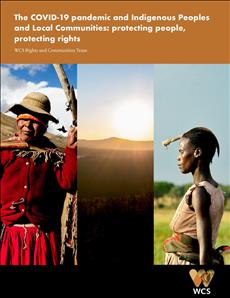Title
The COVID-19 Pandemic and Indigenous Peoples and Local Communities: Protecting People, Protecting Rights
Author(s)
WCS Rights and Communities Team
Published
2020
Abstract
Around the globe each day, there are new reports of cases of COVID-19 confirmed among Indigenous Peoples and Local Communities (IPLCs). Both are particularly vulnerable to health impacts, including COVID-19, because of inadequate access to healthcare and underlying health conditions such as diabetes, and respiratory disease. These are often a consequence of historical colonization and ongoing neglect by government agencies and changes in diets and lifeways associated with more frequent interaction with outsiders. To protect the health of IPLCs during the COVID-19 pandemic and to prevent their rights from being taken as governments around the world focus on the use and sale of wildlife for human consumption in an attempt to minimize the risk of future zoonotic disease pandemics, policy makers, civil society and grant makers must do more to engage respectfully with IPLCs. By doing so, they will better understand how to support IPLCs self-determined efforts to protect their health and cultures now and in the future. Our long-term work on wildlife health and our close and trusted connections with local partners make it clear that it is vital at this time to create space to better understand and highlight the concerns of Indigenous Peoples and Local Communities, and encourage federal and state government agencies to invest in a One Health approach that will explicitly address their current and future needs. To that end WCS is collaborating with Nia Tero to convene a series of virtual sharing sessions with IPLCs around the world. These will focus on the ongoing proposals to ban commercial trade in wildlife for human consumption in response to the COVID-19 pandemic and how these proposals could influence their lives now and in the future. We are planning four initial sessions (North America, Central and South America, Asia and Oceania) to accommodate different time zones and languages(specifically English, Spanish, and Portuguese with translation where needed). We will also explore the feasibility of engaging representatives of IPLCs in Central Africa. Each will offer a forum for community representatives to share their concerns with other IPLCs, and with governments, grant makers and civil society. We expect outputs to identify shared experiences and insights into how regional, national, and global policies can both help and hinder their efforts to ensure local health and security.
Keywords
COVID-19; indigenous peoples and local communities (IPLCs); IPLC; policy
Access Full Text

Back
DMX3861300000